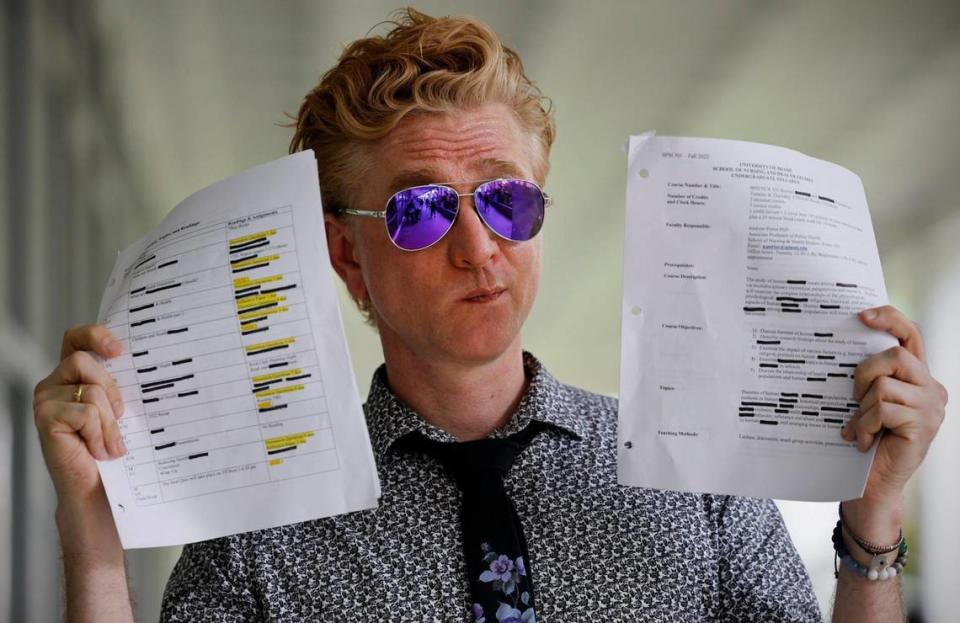UM ‘can’t wait until we’re the targets’: Faculty speak out against Florida higher ed bills
About 150 students and faculty members from the University of Miami gathered Tuesday to condemn two state bills — House Bill 999 and its companion Senate Bill 266 — that if approved as laws, would dramatically transform higher education in Florida.
The two-hour-long discussion that featured about 12 speakers and question-and-answer sessions took place at the Rock Plaza at UM’s main campus in Coral Gables. About four faculty members organized the panel.
The effort follows another earlier this month, in which about 1,000 faculty, staff and students at the University of Miami signed an open letter opposing HB 999.
One of Tuesday’s speakers, Andrew Gothard, president of United Faculty of Florida, the statewide union that represents about 25,000 faculty members in higher education, said the bills build upon “nasty work that was done in the last few years” by the Florida Legislature.
SB 266 and HB 999 are the result of Gov. Ron DeSantis’ narrative that professors are indoctrinating students into the “woke” left. They follow the Stop WOKE Act, which became law in Florida in 2022 and restricted campus programming on subjects like privilege, oppression and racism.

READ MORE: Few complained of ‘woke’ classes at Florida universities. Still, DeSantis pushed new bans
Among other impacts, SB 266 and HB 999 would ensure students at the state’s 12 public universities and colleges aren’t being taught “theories that systemic racism, sexism, oppression, and privilege are inherent in the institutions of the United States and were created to maintain social, political and economic inequities.”
The bills would also make it more difficult for professors to hold onto tenure, would prevent faculty from appealing the firing of a tenured professor beyond the university president level, and create “civics institutes” at three universities.
However, these measures are still going through the legislative pipeline, meaning lawmakers are still editing them before the Florida Legislative session ends on May 5. Last Tuesday, a key Senate committee approved a complete rewrite of one of those bills and scrubbed any references to “diversity, equity and inclusion” in the bills after concerns that restrictions on DEI programs could endanger accreditation and loss of funds of certain programs.
READ MORE: Lawmakers sought to remove DEI from higher ed. Now they’re scrubbing it from the bill
Why are UM faculty concerned?
The two proposals would only affect the 12 state universities run by the Florida Board of Governors, not private institutions like UM. But some speakers argued that UM faces the threat as well.
“The university can’t wait until we’re the targets,” said Charlton Copeland, a professor of law and the associate dean for intellectual life at the School of Law who’s been at UM for about 16 years. “How do you establish precedent for intruding into these kinds of institutions? To the extent that the university has at least collectively been quiet about that is a shame on us.”

Jacqueline Menendez, a UM spokeswoman, didn’t immediately respond to a request for comment about the event.
Morgan Gianola, a UM post-doctoral student in behavioral medicine and cardiovascular diseases, said he worries research will slow down in Florida because researchers will fear losing funding or losing their tenure status.
Gianola said he studies health disparities at different communities and that includes systemic racism, environmental justice and other concepts that the bills attack.
“My graduate mentor did a grant with another researcher at [Florida State University], so even though Miami is a private school, we have a lot of relationships with public schools. It brings up the question ... is the funding going to be pulled when we’re researching things they don’t like?” he said. “We might not do the research with the intention of finding disparities, but that might be what the data shows us.”

Marina Magloire, an assistant professor of English and another panelist who said she attended to share her perspective as a Black feminist, also brought up the issue.
“It would be a mistake to think this legislation doesn’t affect us at a private university, because these bills undermine intellectual freedom in the entire state, and perhaps the country if DeSantis ever has the chance to use these tactics on a federal level as president, as is clearly his intention,” she said.
What’s happening inside classrooms
In challenging the belief that professors indoctrinate students into the political left, Michael Bustamante, a UM history professor, said he and his colleagues struggle to get students to read his syllabus, “much less regurgitate our every word.”
He said most want to teach students “how to think, not what to think.” He also read aloud a line in his syllabus that lets students knows everyone’s points of views are welcome and will be respected as long as they respect others’ points of views.
Andrew Porter, a professor in the School of Nursing and Health Studies at UM, said he redacted his own syllabus to show how the bills would change it.

“I teach a class about issues in health disparities. It became health because I can’t talk about issues or disparities,” he told the crowd.
John Castro, a sophomore who’s majoring in education and wants to be a teacher, identifies as a gay man and asked panelists how he can follow his dreams considering Florida’s political climate. He got advice that varied from moving to another state to watching his back in case he gets sued.
“It was nice to become aware of what’s happening,” said Castro, originally from New York. “It was very helpful.”



